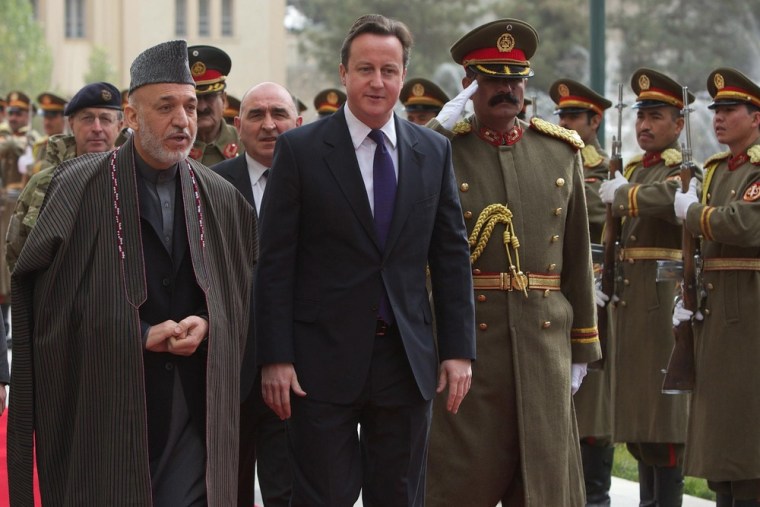British Prime Minister David Cameron, visiting Afghanistan on an unannounced trip, said troops could start withdrawing from the country as early as next year.
Cameron, who arrived on Monday, shrugged off U.S. and Afghan criticism of the troops' performance, saying it no longer held true. Troops deployed in the Taliban stronghold of Helmand were "not up" to the task of securing the province, American diplomats said in cables released by WikiLeaks last week.
At a conference in Lisbon last month, NATO leaders agreed to meet Afghan President Hamid Karzai's timeline for foreign troops to end combat operations in Afghanistan by the end of 2014. Some U.S. and NATO leaders have warned that may spill into 2015.
That has thrown the spotlight on the readiness of Afghanistan's roughly 260,000 police and soldiers to take over from foreign forces.
Cameron and Chief of the Defense Staff General David Richards, the head of Britain's armed forces, both painted an upbeat picture of progress in training the Afghan army.
"I think though next year, as we've agreed, it's conditions-based but looking at the progress we've made, I was only here three months ago it's quite astronomical how quickly things are coming together," Richards said.
U.S. and NATO commanders have been talking up improvements in Afghan forces, although others acknowledge there are problems with the training, equipment and retention rates among Afghan forces and that a target of 306,000 for Afghan forces by October 2011 might be hard to meet.
Both Cameron and Richards said improving conditions could allow British troops to start withdrawing next year. Cameron has passionately defended his deadline of having no British troops in combat operations by 2015.
Britain has about 9,500 troops in Afghanistan, the bulk of which are in Helmand, where they were spread thinly until U.S. President Barack Obama last December ordered an extra 30,000 troops to the Afghanistan, the last of which arrived in August.
Obama will review his Afghanistan war strategy this month, with civilian and military casualties at their highest level since the Taliban were ousted in 2001 despite the presence of about 150,000 foreign troops.
British troops have been able to concentrate on smaller, strategic areas of Helmand since the extra U.S. troops arrived, officials said.
At least 346 British troops have died in Afghanistan since 2001, almost a third of them this year.
Casualty rates among foreign troops have risen dramatically, particularly in the south and east, since July 2009 as NATO-led forces mounted more operations against Taliban-led insurgents.
Criticism
The apparent criticism of British troops was contained in confidential U.S. embassy comments obtained by WikiLeaks and published over the past week by media outlets including Britain's The Guardian newspaper.
According to one 2008 cable published by The Guardian, U.S. diplomats in Kabul said British troops were "not up to the task" of securing Helmand.
Another cable said Helmand governor Gulab Mangal had told U.S. officials in January 2009 that American forces were urgently needed.
"The force density issue ... you can absolutely feel it on the ground, it makes a difference," Cameron told reporters at Camp Bastion in Helmand.
"When you look at what was said, it was relating to a previous period, when we all know now there weren't enough troops in Helmand," he said. Cameron said the criticism of British efforts in Afghanistan had not damaged ties between the two countries.
"I think the British-American relationship is incredibly strong ... of course WikiLeaks has led to lots of embarrassing questions but I think in the end it just doesn't change any of the fundamentals between Britain and America," he said.
